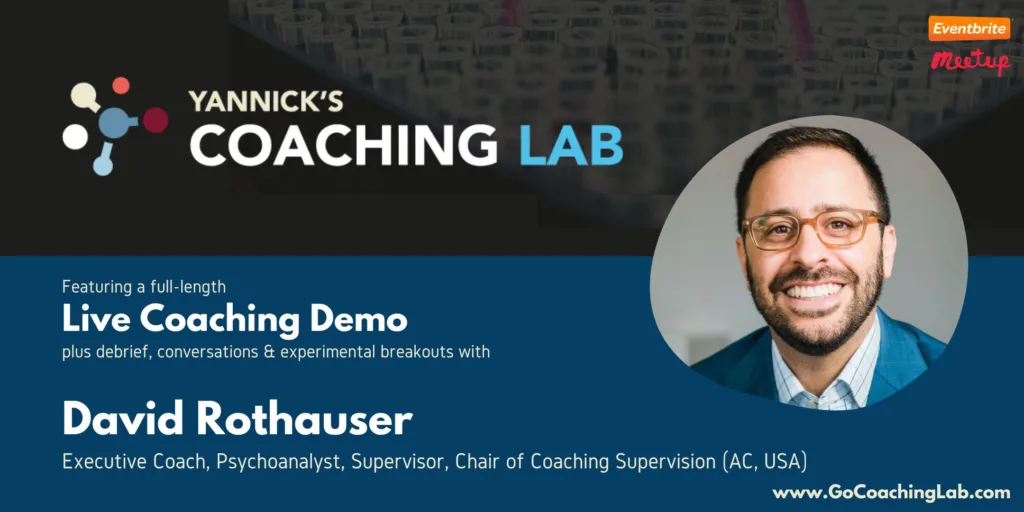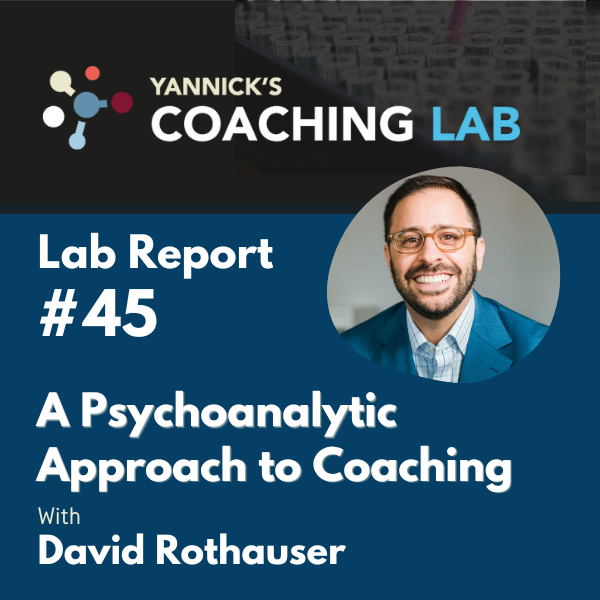
Yannick’s Coaching Lab features guest coaches from a broad variety of approaches, who showcase how they work as part of a live 45min coaching session, followed by reflections and Q&A with the audience.
Curious to know what this session was like? Have a peek at the Lab Report below or consider VIP membership to access the full recording of this and many more exciting sessions.
Yannick’s Coaching Lab #45 — David Rothauser
Lab Report by Natalie Fraser
Summary
David Rothauser is an executive coach, psychoanalyst, and coach supervisor. He is the Chair of Coaching Supervision for the Association for Coaching (US) and runs a private and group supervision practice. He has engaged with many different careers and coaching trainings. While he studied psychoanalysis, he does not describe his coaching as ‘psychoanalytic coaching’. While psychoanalysis informs his work, he sees himself and the client at the heart of what informs his work. David described his coaching room as a “living laboratory”.
David and his client are new to each other, and before this session spoke only for about 10 minutes. The aim for that brief meeting was to provide space for each to acknowledge there would be a performance element to the coaching conversation, and have a human moment together before “the cameras turn on”, rather than engaging in any contracting or coaching content.
David’s client wanted to explore his return to his home country, where he hasn’t lived since the age of 18. He has lived abroad for 14 years, and next month will return home. A new job and good friends await him, yet not having a sense of belonging is a concern he remembers from the past and is anxious may be re-experienced.
Key Moments
The performance aspect of this session taking place in the coaching lab was acknowledged by both, who both recognized an element of performance anxiety. Both agreed to bring this into the session if they needed to or noticed it impacting the process.
David asked if there’s anything his client needed in the realms of contracting withing the 45 minute session. “Can you agree that I will be in the role of coach and you will be in the role of client?”. His client expressed that he’s not easily upset and happy to be interrupted: “everything is good!”.
What are you in touch with now? David invited the client to share what he would like to explore in this session: returning to his home country after 14 years abroad, concerns over belonging & isolation, being himself & authentic, meeting his essential needs: connection, intimacy (he would like to become in a relationship), and integrating himself into his new life.
David reflected that his client “really seems to know himself”, and asked if specifically in today’s session there was a goal? “Confidence, knowing myself.”
“You became tearful there for a moment when you mentioned confidence, could you describe what feeling this is connected with. A memory? An association?”
–> Fear of being exposed as a fraud, as a loser
“There are going to be loose ends after this” David interrupted his client as he was about to share a childhood memory in an effort to contract around potnetial safety issues around feeling exposed, considering the concern his client felt about being exposed, the limited time, and the audience – David explored with his client how it would feel to be exposed in this session, and invited that he’s available after this session if he’d like to speak for any reason – this created an extra layer of psychological safety.
A goal was identified: “being more confident in the choices I make, and my need to justify myself in front of others which I’ve been doing a lot lately”
A key ‘other’ was identified, the main character which causes these inner battles: the client’s sister. David asked his client to describe his sister, with a theme of ‘being settled’ identified as a contrast between their lives. Judgement and lack of support was revealed to be at the heart of David’s client’s confidence to be himself and trust his choices.
In a world of no consequences what would you say to her? How would you say it? Powerfully invited his client to perform his fantasy and really express his truth. This revealed important unmet needs: to be understood, to be supported.
Speculate! When the client didn’t want to engage in thinking about how his sister may respond to him, David invited him to forget about what’s right and true, and consider what might be going on for his sister, what her ‘eye rolls’ and comments may mean, as essentially our relationships can have a separate life in our minds, in addition to being real people.
David drew on his client’s interest in becoming a coach, inviting him to consider what he’d ask his sister from a coaching perspective with the intention to move their relationship to a new place, thereby tapping into the client’s existing resources.
Where are you now? is how David began closing the session, acknowledging opening a life-long topic, invited space for reflection of what came up in the space.
Insights & Take-aways
As a new client to coaching, David’s invitation not to be perfect or ‘get things right’ was incredibly reassuring.
Coach-coachee resonance. The universality of the impact of siblings on each other was raised, and David shared that his own sibling came up for him after the session exploring his client’s sibling influence. David considered that this may have influenced how he engaged with his client. “our unconscious minds come into contact with each other”.
Holding clients in mind between sessions – “a coaching client is like renting a parking spot in my psychic garage.”
Note keeping. Part of David’s process is to take notes after the session. This is to help him understand his own mind, and assist letting go of the session content so he can be present in his life outside the coaching space.
Q. Why offer the ‘inner sister’ concept to play with during and beyond the session?
A. Because [client] wanted to explore himself, not his relationship with his sister, which this session could have ended up focusing on.
“If the coach gets too busy driving the action, they can become patronizing and infantilizing”
Interpretation vs. ‘naming something that was true to you’ – if we sense something as a coach and name it, sometimes it may resonate yet sometimes it will not.
“The unconscious mind is an unruly place” the theory goes that “everyone either wants to have sex with you or kill you”. During the Q&A David explains the basic principles of psychoanalysis in relation to his work in this session, although notes that he does not use psychanalytic terminology generally.
“This work should be pleasant. It might be deep work, but it doesn’t have to be painful.” Humor is an important part of David’s signature.
Watch the recording of this session by joining the Lab as a member: www.GoCoachingLab.com
A list of all available recordings can be found at https://bit.ly/LabRecordings
This Lab Report was authored by Natalie Fraser
Natalie is an existential Counselling Psychologist, specialising in trauma and transformation, and curious about coaching. Interested in exploring life’s Big Questions? Find out more at: www.existentialofferings.com

